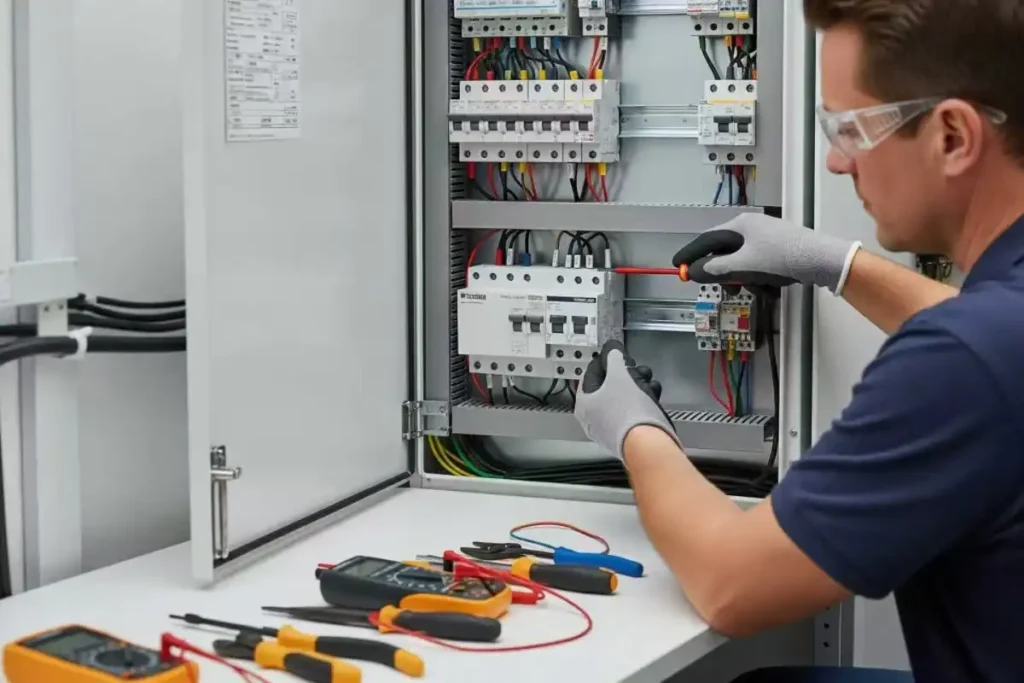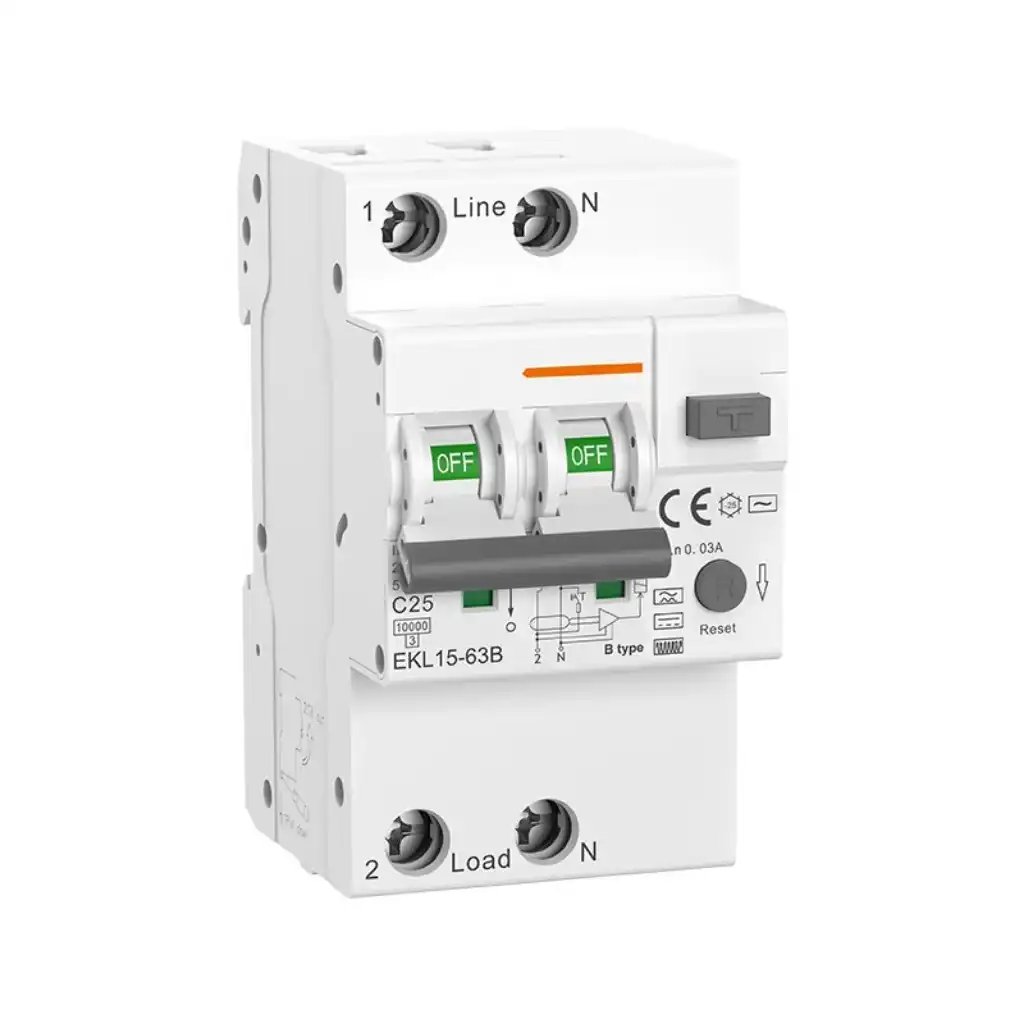Commercial venues that need RCBO devices include offices, retail stores, restaurants, hotels, hospitals, schools, and factories. Any place with high electrical risk must have RCBO in those commercial venues to ensure safety. RCBO in those commercial venues keeps people and equipment protected by stopping both overcurrent and earth leakage faults. This double protection reduces the chance of injury and helps businesses operate with fewer interruptions. Following these guidelines keeps everyone safe and complies with legal requirements.
Key Takeaways
- RCBO devices help keep people and equipment safe. They stop problems from too much current or earth leakage in commercial places.
- Offices, stores, restaurants, hotels, hospitals, schools, and factories need RCBOs. These places use them to stay safe and follow the law.
- RCBOs turn off power fast only on the bad circuit. The rest of the building keeps working well and does not stop.
- RCBOs help lower the chance of electric shocks, fires, and broken equipment. This helps businesses save money and stay safe.
- You should always ask licensed electricians for help when putting in RCBOs. Follow local rules to make sure you are safe and following the law.
RCBO in Those Commercial Venues

Offices and Retail
Offices and stores need RCBO in those commercial venues to keep people and equipment safe. These places use lots of electrical devices like computers and lights. RCBOs work as both a miniature circuit breaker and a residual current device. This saves space and gives strong protection.
- RCBOs can find leakage currents as small as 30mA and shut off power in 0.1 seconds. This helps stop electric shocks.
- They prevent fires by stopping arcing faults from damaged wires.
- RCBOs have fire-resistant plastic cases, so they work well with commercial voltage.
- Staff can see trip indicators and fix problems fast, which makes things safer.
- Their small size fits easily in office or store panels.
RCBO in those commercial venues makes sure one bad circuit does not shut down the whole building. This keeps businesses working without long stops.
Restaurants and Hospitality
Restaurants, hotels, and other places for guests have special electrical dangers. Kitchens, laundry rooms, and outdoor spots have water and strong machines. RCBO in those commercial venues is needed because it protects from too much current and earth leakage.
- Kitchens and bathrooms are risky because of water.
- RCBOs turn off power fast if there is a problem, so people do not get shocked or start a fire.
- Hotels and restaurants need power all the time for guests. RCBOs only shut off the broken circuit, so everything else keeps working.
Local rules often say RCBOs must be used, especially when fixing or updating buildings. This keeps staff and guests safer.
Healthcare and Education
Hospitals, clinics, and schools need good electrical safety. These places help people who need extra care, like kids and older adults. RCBO in those commercial venues gives two kinds of protection, which is very important.
| Device | Protection Type | Overcurrent Protection | Leakage Protection |
|---|---|---|---|
| MCB | Overload/Short-circuit | Yes | No |
| RCD/RCCB | Residual current protection | No | Yes |
| RCBO | Combined overcurrent and leakage | Yes | Yes |
RCBOs only shut off the circuit with a problem. This keeps important things, like medical tools or classroom lights, working. RCBOs act faster than regular breakers, sometimes in less than 40 milliseconds. New rules often say RCBOs are needed in wet or special places, like bathrooms or science labs, for better safety.
Industrial and High-Risk Areas
Factories, warehouses, and other big work sites have more electrical dangers. These include leakage currents, too much power, short circuits, and earth faults. RCBO in those commercial venues helps protect workers and machines.
- Industrial places use machines with electronic controls and special drives.
- Solar panels and EV chargers can cause more faults and leakage currents.
- RCBOs find problems and shut off power quickly, stopping shocks, fires, and damage.
Many places have laws that say RCBOs must be used where lots of machines run or where people need extra safety. Adding RCBOs during building updates makes things safer and helps follow the rules.
Tip: Always look at local rules before you put in or change electrical systems. Some places have strict laws about using RCBO in commercial and industrial buildings.
RCBO Function and Safety
Overcurrent and Earth Leakage Protection
RCBOs keep commercial places safe from two big dangers. One danger is overcurrent. This happens when too much electricity goes through wires. Wires can get very hot or even catch fire. The other danger is earth leakage. This means electricity escapes from the wires. It can go through water or a person. This can cause shocks or fires.
- RCBOs do the jobs of MCBs and RCDs together. They stop too much current and earth faults.
- RCBOs find small leaks, even as low as 30mA. They shut off power fast to keep people safe.
- These devices are small and fit well in busy places.
- RCBOs help businesses follow new safety rules. These rules say places need protection from both dangers.
- Using RCBOs lowers the chance of fires and shocks. MCBs alone cannot stop all problems.
Inside RCBOs, there are special parts called residual current devices. These parts check if the wires have the same amount of electricity. If there is a problem, the RCBO turns off the power. This quick action keeps people and things safe.
| Feature | Electromagnetic RCBO | Electronic RCBO |
|---|---|---|
| Power Requirement | No extra power needed | Needs extra power |
| Sensitivity | Medium | More sensitive |
| Reliability | Very reliable | Not as reliable as electromagnetic |
| Interference Immunity | Handles interference well | Not as good with interference |
| Safety Performance Impact | Works well in tough places | Sensitive but not as steady in noisy places |
Business Continuity Benefits
RCBOs help businesses keep working without big stops. They find problems in one circuit and turn off only that part. The rest of the building still has power. This means less time with no electricity.
- RCBOs stop full power loss by turning off just one circuit.
- They help protect machines from damage and costly fixes.
- Fast fault finding lets workers fix things quickly. This keeps work safe and steady.
- RCBOs are small, so they fit easily in crowded panels.
Tip: RCBOs help businesses avoid big electrical problems. They keep offices, factories, hospitals, and labs running. This saves money and keeps people safe.
Regulations and Standards
U.S. Codes and GFCI Equivalents
The United States uses the National Electrical Code (NEC) for safety rules. These rules help keep commercial buildings safe from electrical dangers. The NEC says ground fault protection is needed in many places. GFCI breakers work like RCBOs because they stop too much current and ground faults. Businesses must follow these rules to keep people safe and pass inspections.
The NEC has added more places for GFCI protection over the years. These changes show how safety rules grow to cover new dangers. Here are some important updates:
- Underwater swimming pool lights (1968)
- Construction sites (1974)
- Bathrooms and outdoor areas (1975)
- Garages (1978)
- Areas near hot tubs or spas (1981)
- Hotel bathrooms (1984)
- Kitchen counter receptacles (1987)
- Crawl spaces and unfinished basements (1990)
- Near wet bar sinks (1993)
- Near laundry sinks (2005)
- Laundry rooms (2014)
- Kitchens, including places away from water (2023)
GFCI breakers in these spots help stop shocks and fires. The NEC says these devices must be used where there is water or high risk. Inspectors look for GFCI protection when they check buildings. Insurance companies also want to see these codes followed.
Note: GFCI breakers in the U.S. work like RCBOs in other countries. They give both ground fault and overcurrent protection in one device.
International RCBO Requirements
Many countries have changed their rules for RCBOs in businesses. These changes focus on fire safety, escape routes, and stopping electrical problems. New standards ask for better labels and testing for safety devices. The table below shows some important updates:
| Regulation/Section | Summary of Update Relevant to RCBOs and Commercial Venues |
|---|---|
| Regulation 422.1 | Fire safety design paperwork needed; cables must be safer in fires. |
| Regulation 422.2 | New rules for protected escape routes added. |
| Chapter 44 (Reg 443.4 & 443.4.1) | Protection from sudden high voltage needed if it could cause injury, safety service failure, or big money/data loss. |
| Section 514 | New label and paperwork rules, with some exceptions for homes; labels now show Surge Protective Devices (SPDs). |
| Chapter 53 | RCBOs must be used for single circuits in homes to stop unwanted trips; limits on RCD Type AC use. |
| Chapter 64 | New testing rules for RCDs, using alternating current tests at set levels for all types. |
| Section 711 | Final circuits for outlets or handheld gear in businesses must have automatic shutoff with extra 30 mA RCD protection, SELV, PELV, or electrical separation; new rules for turning off, switching, and lighting setups. |
These changes help businesses lower risks and pass inspections. New rules make sure buildings use the right devices and keep records. Insurance companies may ask for proof before giving coverage.
Tip: Always check for new local and international rules. Following the latest standards helps keep people and property safe in commercial buildings.
Compliance Steps
Inspection and Installation
Commercial venues need to follow steps to keep RCBO devices safe. Checking electrical panels often helps find problems early. Electricians look for labels, right device ratings, and any damage. They also test if RCBOs turn off power when needed.
It is best to use RCBOs that protect from both too much current and earth faults in all boards. Outlets, bathrooms, and lights need 30mA RCBOs because they are more sensitive. Panels should let main switches turn off all live wires at once. Good earthing and bonding keep people and equipment safe. In medical places, PEN conductors are not allowed.
The table below lists important ways to install RCBOs:
| Aspect | Best Practice / Code Requirement |
|---|---|
| RCBO Use | Install RCBOs in all distribution boards |
| Sensitivity | Use 30mA RCBOs for outlets, bathrooms, lighting |
| Isolation | Main isolators must disconnect all live conductors |
| Earthing/Bonding | Ensure proper earthing and bonding; no PEN in medical areas |
| Environmental Protection | Use panels with correct IP rating for the location |
| Circuit Identification | Label all circuits clearly |
| Verification/Testing | Inspect and test after installation |
Tip: Always pick cables that do not burn easily. Keep power, lighting, and control wires apart to stop problems.
Consulting Professionals
Commercial venues should work with licensed electricians and engineers. These experts know the rules for RCBOs in different places. They help choose the right RCBOs for each building. Experts make sure only the broken circuit turns off, so the rest keeps working.
Professionals test everything after installing RCBOs to make sure it is safe. They give papers for inspections and insurance. Getting help from experts stops mistakes and helps follow rules like IEC 60364 and BS 7671.
Note: Expert advice keeps everyone safe and helps businesses pass checks without waiting.
Commercial places like offices, stores, restaurants, hospitals, and factories need RCBO in those commercial venues. This is important for safety and following the law. Using RCBOs helps protect people and things. It also helps businesses keep working. Owners should talk to licensed electricians and check local rules. Taking safety steps early is smart. These steps include:
- Pick RCBOs that have two kinds of protection and are very sensitive.
- Set up each RCBO for its own job.
- Make sure RCBOs are put in right so they do not fail because of bad wiring or wrong connections.
Checking RCBOs often and using smart tools helps stop dangers and keeps everyone safe.
FAQ
What does an RCBO device do in a commercial venue?
An RCBO device keeps people and equipment safe. It shuts off power if there is a problem or leak. This helps stop electric shocks and fires. Businesses use RCBOs to protect workers and customers.
What types of commercial venues must use RCBO devices?
Offices, stores, restaurants, hotels, hospitals, schools, and factories need RCBO devices. These places have lots of electrical dangers. RCBOs help follow safety rules and keep everyone safe inside.
What is the difference between an RCBO and a GFCI breaker?
| Device | Overcurrent Protection | Earth Leakage Protection |
|---|---|---|
| RCBO | Yes | Yes |
| GFCI | No | Yes |
RCBOs protect against both problems. GFCI breakers only stop earth leakage.
What should a business do before installing RCBO devices?
Tip: A business should talk to a licensed electrician for help. They should look at local rules and check electrical panels. Good planning helps meet safety rules and keeps the building safe.
See also
Understanding RCBO Breaker Terminology Made Simple
RCBO residual current circuit breaker with overcurrent protection
How to Safely Connect RCBOs in Your Electrical Distribution Panel
What Features Make an RCBO Essential for Modern EV Charger Setups
Key Differences Between RCD, MCB, and ROCO Devices




